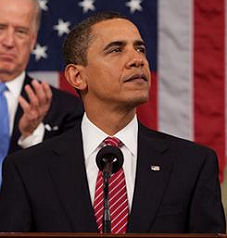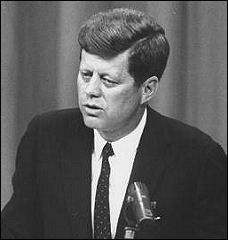It breaks my heart to seriously consider and in fact strongly suspect that Barack Obama peaked as a campaigner, and that he just doesn’t have the guts to stand up like Harry Truman or Theodore Roosevelt and fight the big-money pigs (Republicans, corporates) who have cajoled and berated this country in a pit of special-interest slime and quicksand — a pit that fewer and fewer people believe we have any chance of digging ourselves out of.


Presidents Barack Obama, John F. Kennedy
There is no sicker joke these days that the concept of bipartisanship with Republicans, and yet Obama actually called for this in last night’s State of the Union address. He’s becoming a rank embarassment. I honestly believe he’s just about finished.
Courage is a funny thing. You can talk about it all you want, but when the moment comes you need to find it within and use it. You need to grim up and look the other guy in the face and say “that’s enough” and “back off or I will deliver consequences.” And some people just don’t have that fibre, that constitution. Either Obama feels he has to be mellow and accomodating at all costs because he can’t be an angry African-American, or he’s just naturally wimpy when it comes to the tough stuff. Either way a necessary Presidential character element just doesn’t seem to be there.
In a column last Sunday titled “After The Massachusetts Massacre,” Frank Rich compared Obama’s dealings with the avaricious corporates and their paid legislative whores to John F. Kennedy‘s response to U.S. Steel’s Roger Blough after the latter announced a $6 a ton price hike in April 1962.
“Last year [Obama] pointedly studied J.F.K.’s decision-making process on Vietnam while seeking the way forward in Afghanistan,” Rich wrote. “In the end, he didn’t emulate his predecessor and escalated the war. We’ll see how that turns out. Meanwhile, Obama might look at another pivotal moment in the Kennedy presidency — and this time heed the example.
“The incident unfolded in April 1962 — some 15 months into the new president’s term — when J.F.K. was infuriated by the U.S. Steel chairman’s decision to break a White House-brokered labor-management contract agreement and raise the price of steel (but not wages). Kennedy was no radical. He hailed from the American elite — like Obama, a product of Harvard, but, unlike Obama, the patrician scion of a wealthy family. And yet he, like that other Harvard patrician, F.D.R., had no hang-ups about battling his own class.
“Kennedy didn’t settle for the generic populist rhetoric of Obama’s latest threats to ‘fight’ unspecified bankers some indeterminate day. He instead took the strong action of dressing down U.S. Steel by name. As Richard Reeves writes in his book ‘President Kennedy,’ reporters were left ‘literally gasping.’
“The young president called out big steel for threatening ‘economic recovery and stability’ while Americans risked their lives in Southeast Asia. J.F.K. threatened to sic his brother’s Justice Department on corporate records and then held firm as his opponents likened his flex of muscle to the power grabs of Hitler and Mussolini. (Sound familiar?) U.S. Steel capitulated in two days. The Times soon reported on its front page that Kennedy was at ‘a high point in popular support.’
“Can anyone picture Obama exerting such take-no-prisoners leadership to challenge those who threaten our own economic recovery and stability at a time of deep recession and war? That we can’t is a powerful indicator of why what happened in Massachusetts will not stay in Massachusetts if this White House fails to reboot.”









